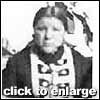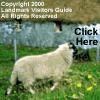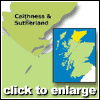After two generations of Clearances the traditions of crofters following their chieftain into battle stopped when they finally had to acknowledge that their chieftains no longer cared for them. The crofters of the Sutherland Estate, for example, had traditionally enlisted in the Army at a moment's notice when asked to do so by the estate. In 1745, 2550 men from Sutherland fought; in 1760, 1100 men enlisted in 9 days; in 1777 1100 enlisted; in 1794 1800 enlisted. But when enlisting officers toured the Highlands in 1854 to recruit men to fight in the Crimea they were greeted with the men bleating like sheep and turning away from them. The Duke of Sutherland was personally told, "We have no country to fight for. You robbed us of our country gave it to the sheep. Therefore, since you have preferred sheep, let the sheep defend you."
Eventually the people made a stand. They organized rent strikes, made articulate appeals to the Press and even rioted on Skye. Gun boats, marines and police officers were called in to fight unarmed men and women and eventually in 1883 a commission was set up under Lord Napier to find out just what was going on in the Highlands and Islands.
 As a result of his report the Crofters act was passed in 1886, which finally gave the Highlanders and Islanders some basic land rights and rights of tenure. The Crofters Act had been drafted mainly by the landlords themselves, who were often also Members of Parliament, and it was treated by the crofters with the same contempt as were the so-called treaties the Native Americans were given when being Cleared to reservations in North America.
As a result of his report the Crofters act was passed in 1886, which finally gave the Highlanders and Islanders some basic land rights and rights of tenure. The Crofters Act had been drafted mainly by the landlords themselves, who were often also Members of Parliament, and it was treated by the crofters with the same contempt as were the so-called treaties the Native Americans were given when being Cleared to reservations in North America.
A speech made at the Lochcarron School hall in 1886 after hearing about the Crofter's Act being passed articulately expresses this:
The plough is put away, up on the hen-roost,
The land it once ploughed is empty, a waste-
The land of our ancestors, stolen away from us.
If it came back to us again, we'd complain no more
Of landlords' injustice, of the injury and prejudice
Handed out to the Gaels.
Ah then we would know exactly what to do-
We'd drive out the keepers, and the English who come here
To ruin us and our land for their sport on the hill.
We'd drive the deer that have taken over our ploughing land
Up, high up on the tops of the mountains-
And down would come Nimrod.
 And the sheep, oh the sheep, has been the cause of great suffering
And the sheep, oh the sheep, has been the cause of great suffering
Starvation and sorrow, It has driven many to the shore,
And over the sea. My body has know the pain of seeing
White sheep and deer nibble at the land they have left.
That would feed many and many a Gael.
But the time will come when plough will be out again,
When the garron will be harnessed and pulling away.
When the people will eat well, with cattle on the hill,
And milk in the dairy, and go no more to the Caithness fishing-
When we earn cash at home.
This Bill the government shows to us, what is it?
There is in it no word of all this.
No word of a patch to plant a crop,
Now word of the right to a place where a poor man's cows might graze.
We will not submit to it, for it has no word of what we need:
A share of the good, low-lying land, to produce food
For our children-and their children.
Written and published by the Highland Clearances Memorial Fund
Back to Highland Clearances Memorial Fund Series Main Page
Part One:
Background
Part Two:
Highland Portrait
Part Three:
Bonnie Prince Charlie
Part Four:
The Clearances
Part Five:
The Improvements
Part Six:
The Sutherland Estate
Part Seven:
The People and the Church
Part Eight:
US Slave-Owners
Part Nine:
Queen Victoria and Red Deer
Part Ten:
1840-1880 Eyewitness Accounts
Part Eleven:
Famine!
Part Twelve:
Famine Immigration
Part Thirteen:
Forced Eviction to the Cities
Part Fourteen:
Changing Ways
Part Fifteen:
Things Change Yet Remain The Same
Appendix A:
Highland Clearances, Dates & Places
Appendix B:
Bibliography



